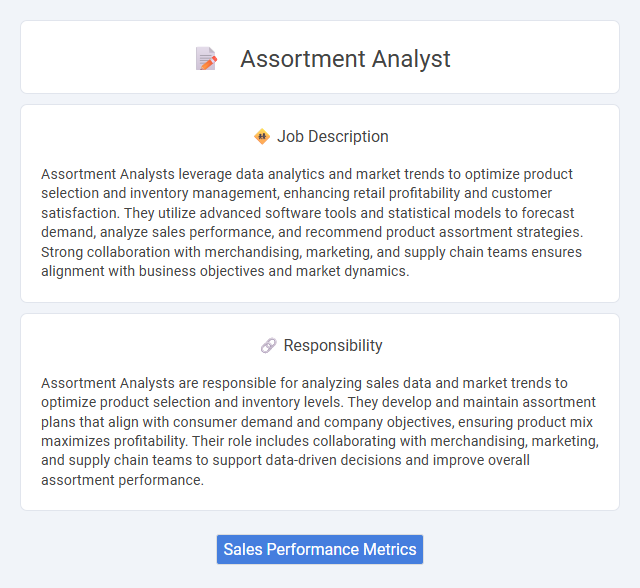
Assortment Analysts leverage data analytics and market trends to optimize product selection and inventory management, enhancing retail profitability and customer satisfaction. They utilize advanced software tools and statistical models to forecast demand, analyze sales performance, and recommend product assortment strategies. Strong collaboration with merchandising, marketing, and supply chain teams ensures alignment with business objectives and market dynamics.
Individuals with strong analytical skills and attention to detail will likely find the Assortment Analyst role suitable. Those comfortable working with data, identifying trends, and making data-driven decisions may thrive in this position. People who prefer routine or less data-centric tasks might find the job challenging or less engaging.
Qualification
Assortment Analyst roles require strong analytical skills and proficiency in data analysis tools such as Excel, SQL, and BI software to optimize product selection and inventory levels. Candidates typically need a background in statistics, business, or supply chain management, paired with the ability to interpret market trends and consumer behavior. Experience with retail analytics, demand forecasting, and vendor negotiation enhances decision-making and supports effective assortment planning.
Responsibility
Assortment Analysts are responsible for analyzing sales data and market trends to optimize product selection and inventory levels. They develop and maintain assortment plans that align with consumer demand and company objectives, ensuring product mix maximizes profitability. Their role includes collaborating with merchandising, marketing, and supply chain teams to support data-driven decisions and improve overall assortment performance.
Benefit
An Assortment Analyst likely enhances inventory efficiency by analyzing sales data and customer preferences, which could result in optimized product selections and reduced overstock costs. This role probably supports improved decision-making, potentially increasing overall profitability through targeted assortment strategies. Employers may also benefit from more effective resource allocation and stronger market competitiveness.
Challenge
The Assortment Analyst role likely presents the challenge of balancing diverse product categories while forecasting consumer demand accurately. Navigating complex data sets to optimize inventory mix could prove demanding, requiring keen analytical skills and market insight. The need to adapt quickly to seasonal trends and shifting customer preferences may increase the role's complexity.
Career Advancement
Assortment Analysts play a crucial role in optimizing product mixes to maximize retail profitability and customer satisfaction. Mastery in data analytics and inventory management opens pathways to senior roles such as Category Manager or Merchandising Director, driving strategic decisions at a higher level. Developing expertise in market trends and consumer behavior significantly enhances career growth prospects within retail and e-commerce sectors.
Key Terms
Sales Performance Metrics
Assortment Analysts utilize sales performance metrics such as sell-through rates, inventory turnover, and gross margin to optimize product mixes and maximize profitability. They analyze historical sales data, customer preferences, and market trends to identify high-performing SKUs and phase out underperforming items. By leveraging advanced analytics and reporting tools, Assortment Analysts contribute to data-driven decisions that enhance merchandising strategies and improve overall sales effectiveness.
 kuljobs.com
kuljobs.com